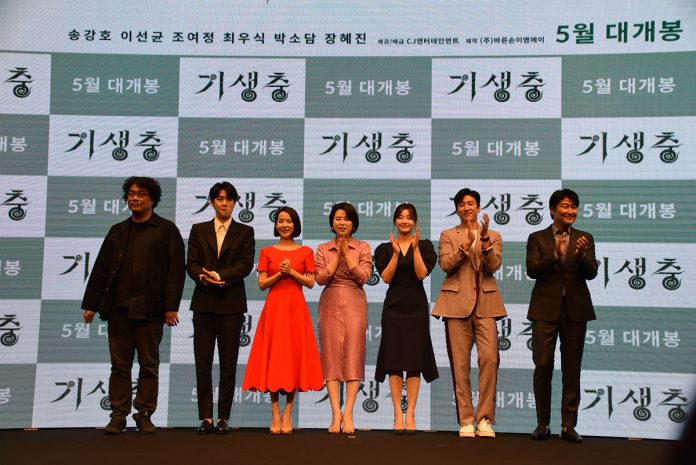The South Korean movie Parasite seems to have made the world its host.
Parasite has broken the Oscar’s language barrier as the first non English language movie to win Best Picture. It has won multiple awards, including three Golden Globes, two BAFTAs and, very recently, four Academy Awards. With four Oscars on one night, Bong Joon-Ho now ties with Walt Disney’s 1953 haul.
Parasite is a movie about the contrast between rich and poor, poverty and luxury and how the rich and the poor classes exist in their very distinct habitats. The story follows the Kim family living in awful conditions and barely getting by. They struggle with money, food, housing, work and even the new necessity wi-fi. That is until Kim Ki-Woo’s (Choi Woo-Shik) good friend, Min (Park Seo-Joon), appears and gives him (and subsequently the rest on the Kim family) the opportunity of a lifetime.
Kim Ki-Woo’s opportunity is to work as an English tutor at a prestigious family. When the rich woman of the house, Park Yeon-Kyo (Cho Yeo-Jeong), struggles with her young son, Da-Song, Ki-Woo suggests his sister posing as aquaintance can help. And on and on until the Kim family infiltrates the Park family’s home.
Ki-Woo tutors the daughter Da-Hye. His sister Kim Ki-Jung (Park So-Dam), becomes art therapist for Da-Song, under her fake name Jessica. They then arrange the family chauffeur to be fired and their parasite family father, Kim Ki-Taek (Song Ka-Ho) is hired as replacement. Lastly, the Kim mother, Kim Chung-Sook (Chang Hyae-Jin) becomes housekeeper after they plot to remove the current house keeper, Moon-Gwang (Lee Jung-Eun).
The Kim parasite family has finally infiltrated the host family Park. For the Kim’s this seems like a dream come true. They’re earning money and can get a taste of the good life, at least for a while.
But then the housekeeper returns and everything begins to unravel. What began as a quirky movie with implicit social and political commentary, enters a final 30 minutes of massacre.
For me, winning Best Picture Oscar was not surprising at all: the director, Bong Joon-Ho, did incredible work. One of my favourite scenes shows Ki-Woo, Ki-Jung and Ki-Taek as they run from the Park family house to their, now, flooded basement in the seemingly never-ending, downward journey (to a dramatic soundtrack) in a heavy downpour. In another award-worthy and iconic scene, Ki-Taek practices the lines he will recite to Park Yeon-Kyo to manipulate her into firing Moo-Gwan.
And the “Jessica Jingle” must also be mentioned. It is sung to the melody of South Korea’s famous song, ‘Korean Old Pop 1982’, about a South Korean territorial dispute with Japan. The tune has been popular in South Korea for decades, and those that don’t know the tune are even suspected of being spies from North Korea.
While the movie is widely praised, not everyone sees the the appeal. When I asked Lee Sunmi, a South Korean acquaintance what she thought, she told me she was not impressed. Sunmi thought the movie was “shallow, even flat”. She thinks Bong Joon-Ho’s lack of political interpretation “objectifies and mocks both rich and poor and even the desire to move up the social ladder”. To an extent, I agree. If one really delves into the story line they’ll be sure to come up with the same view.
But as entertainment, I think we can put the politics to one side. The movie is a great watch and those that haven’t seen it definitely should – even if its to make up your mind on whether this Parasite deserved to infect the whole world.

